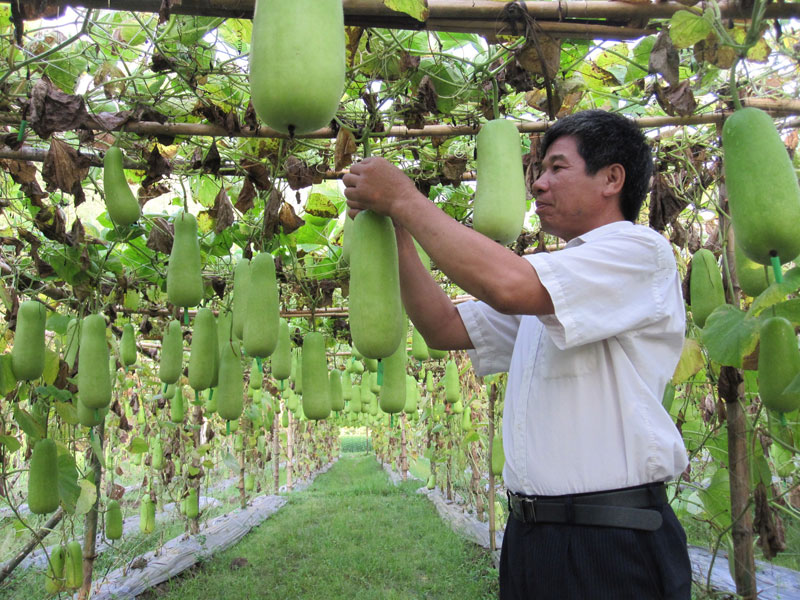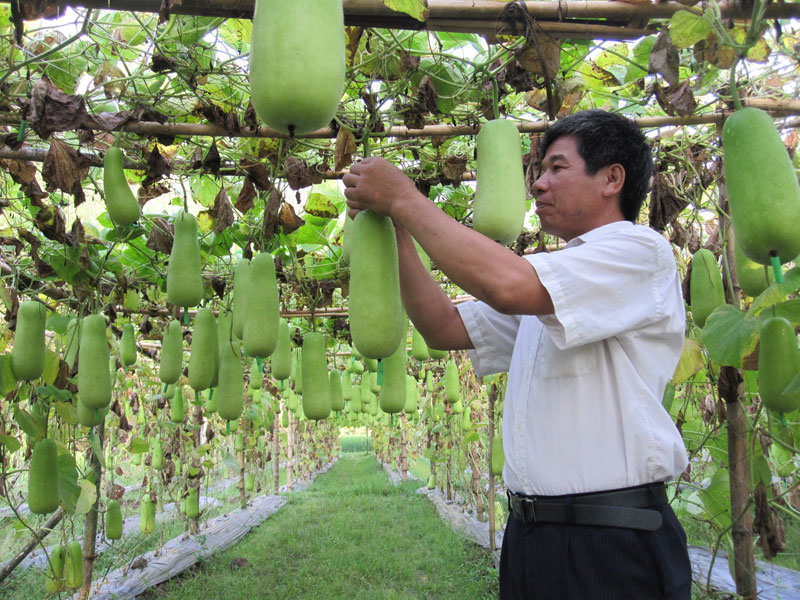
(HBO)-The veteran Vi Van Thin in Lau hamlet, Mai Ha commune is a good example who is doing business well.

The veteran Vi Van Thin in Lau hamlet, Mai Ha
commune (Mai Chau) is taking care of the garden of gourds for collecting.
Not resigning to poverty, Mr. Vi Van Thin
went around to learn about production experience in many places in the district
and in the province and started to plant forests, grow vegetables, combining
with livestock and poultry breeding. However, in the early time the income is
only average, temporarily enough for family living expenses. In 2010, he boldly
borrowed money from the bank along to invest in buying breeds, expanding
breeding facilities with the capital of his family. Additionally, he combined
planting forests, digging ponds to raise fish and raising chickens and growing
vegetables. After many years of persistence, exploring and learning in many
places, getting experiences, his economic development model has given a stable
income. Currently, his family has nearly 100 chickens, 12 pigs, 8 buffaloes and
many kinds of crops with high economic value. Each year his family exports two
litters of 2 chickens, 2 litters of pigs and 3 litters of gourds with the
income of about 250-300 million VND. Mr. Thin said "My family mainly develops
synthetic economy. After borrowing the budget, I have invested in developing
raising livestock, growing crops, digging fish ponds, building cages for pigs,
chickens and ducks and planting perennial trees. In the early days, when I
started to do business due to lack of experience, scientific and technical
knowledge to take care of crops so I thought I had to give up halfway.”
The will and energy of the soldier helped him
overcome the difficulties. He himself learned to apply scientific and
technological advances to animal husbandry and production so it brought high
economic efficiency. After many years, his family has built a comprehensive
economic model of gardens, ponds and stables with very high economic efficiency.
Not only trying to enrich his family, he also
helps other families with difficulties in trees, seedlings such as baby fish
and chicken, other kinds of seeds and so on. He also disseminates the way of
how to take care of plants. Thanks to the development of animal husbandry, his
family now has a spacious house and a stable income, all his children have
stable jobs.
According to data from the Hoa Binh Provincial Party Committee, the industrial production index for the first six months of 2025 is estimated to have increased by 20% compared to the same period last year. This marks the highest year-on-year growth rate for this period since 2020.
In the first six months of 2025, Hoa Binh province’s export turnover was estimated at 1.145 billion USD, marking an 18.11% increase compared to the same period in 2024. Import turnover was estimated at $ 804 million, a 17.15% increase, which helped the province maintain a positive trade balance.
The lives of the ethnic minority farmers in Tan Lac district have gradually improved thanks to the new directions in agricultural production. This is a testament to the collective strength fostered through the professional associations and groups implemented by various levels of the district’s Farmers’ Union.
With the motto the "product quality comes first,” after nearly one year of establishment and operation, Muong village’s Clean Food Agricultural and Commercial Cooperative, located in Cau Hamlet, Hung Son Commune (Kim Boi district), has launched reputable, high-quality agricultural products to the market that are well-received by consumers. The products such as Muong village’s pork sausage, salt-cured chicken, and salt-cured pork hocks have gradually carved out a place in the market and they are on the path to obtaining the OCOP certification.
In the past, the phrase "bumper harvest, rock-bottom prices" was a familiar refrain for Vietnamese farmers engaged in fragmented, small-scale agriculture. But today, a new spirit is emerging across rural areas of Hoa Binh province - one of collaboration, organisation, and collective economic models that provide a stable foundation for production.
Maintaining growing area codes and packing facility codes in accordance with regulations is a mandatory requirement for agricultural products to be eligible for export. Recently, the Department of Agriculture and Environment of Hoa Binh province has intensified technical supervision of designated farming areas and packing facilities to safeguard the "green passport" that enables its products to access international markets.



